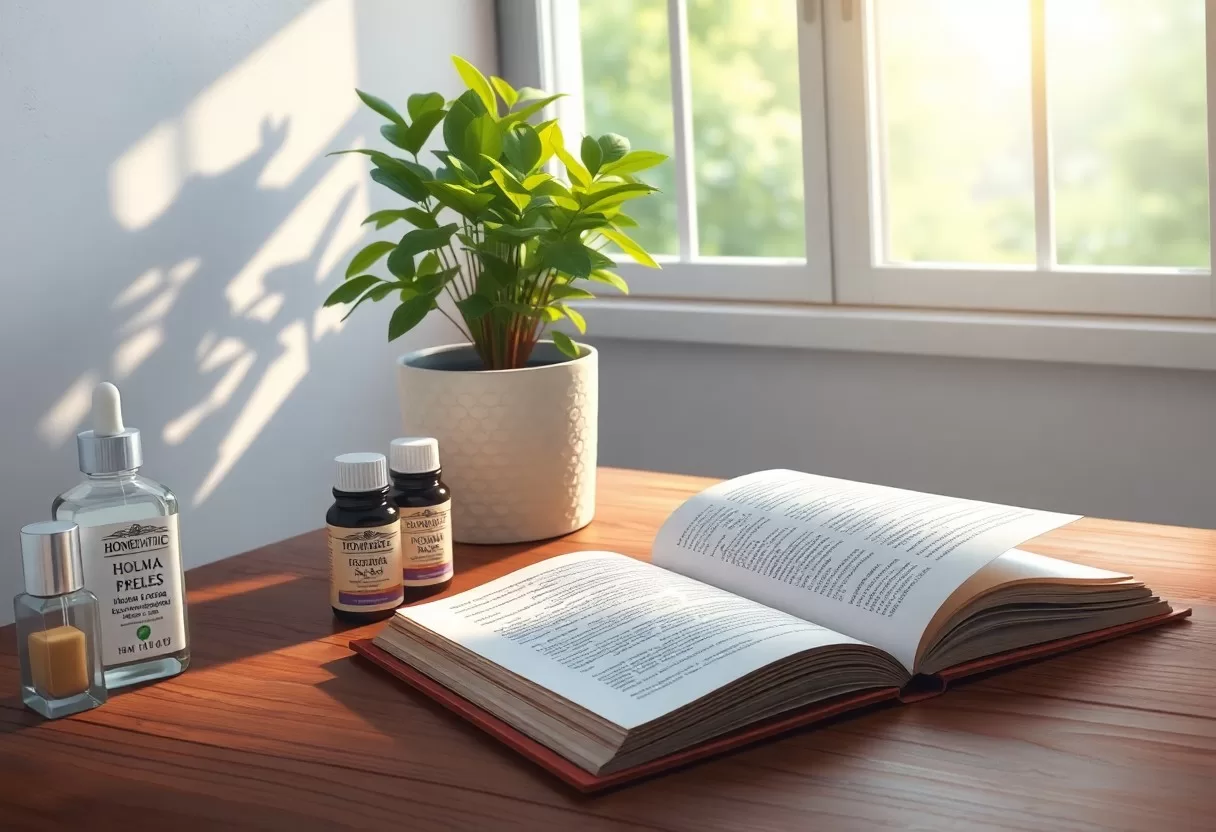Depression can feel overwhelming, often leaving you searching for effective treatment options. Homeopathy offers a holistic approach that focuses on your unique symptoms and overall well-being. By utilizing natural remedies, homeopathic practices aim to enhance your emotional balance without the potential side effects associated with conventional medications. You’ll discover that these remedies can promote long-lasting emotional health and empower you to take control of your mental wellness. In this blog post, we will explore the hidden benefits of homeopathy for managing depression effectively.

Key Takeaways:
- Holistic Approach: Homeopathy treats the individual as a whole, addressing emotional, physical, and mental aspects of depression.
- Naturally Derived Remedies: Homeopathic treatments use natural substances, minimizing the risk of side effects associated with conventional medications.
- Personalized Treatment: Homeopathy emphasizes customized solutions tailored to individual symptoms and experiences, enhancing overall effectiveness.
Understanding Homeopathy
While many people are familiar with traditional forms of medicine, homeopathy offers a unique approach to healing. Rooted in the idea that ‘like cures like,’ homeopathy uses highly diluted substances to stimulate your body’s natural healing processes. This holistic system aims to address not only your symptoms but also the underlying emotional and physical imbalances contributing to your condition, like depression.
Principles of Homeopathy
Along with its foundational principle of treating “like with like,” homeopathy emphasizes an individualized treatment plan. Each remedy is tailored to your specific symptoms, lifestyle, and emotional state, enhancing the overall effectiveness of the treatment. This personalized approach seeks to harmonize your mind and body, allowing you to find balance and promote lasting healing.
Homeopathy vs. Conventional Treatments
Conventional treatments for depression often involve medication and therapy, which can yield quick results but may also come with side effects. On the other hand, homeopathy promotes a gentler, more natural healing process that targets the root causes of your depression rather than just alleviating symptoms.
Treatments can differ significantly, with conventional methods often providing immediate relief, but they might lead to unwanted side effects or dependency. In contrast, homeopathy’s gentler approach minimizes side effects and works towards long-term emotional balance, helping you reconnect with your inner self. This personalized method can also provide support for those who feel resistant to standard antidepressants, making it an appealing option for anyone seeking a more holistic solution.
Depression: A Brief Overview
Some individuals may face challenges with depression, a common yet serious mental health condition that affects how you feel, think, and handle daily activities. It is more than just feeling sad or having a bad day; it can lead to a range of emotional and physical problems, making it difficult to function and enjoy life. Understanding depression is the first step towards seeking appropriate help.
Symptoms and Types of Depression
Symptoms of depression can manifest in various forms, often categorized into different types:
| Common Symptoms | Types of Depression |
| Persistent sadness | Major depressive disorder |
| Loss of interest | Persistent depressive disorder |
| Fatigue | Bipolar disorder |
| Feelings of guilt | Seasonal affective disorder |
| Difficulty concentrating | Psychotic depression |
This variety highlights the need for personalized treatment plans to address your unique experiences.
Traditional Approaches to Treatment
At times, when you seek to manage depression, traditional treatment methods such as medication and therapy may be considered. Medications like antidepressants can help balance chemicals in your brain, while therapy offers a safe space to explore feelings and develop coping strategies.
It is important to be aware that while these methods may provide significant relief, they also come with potential side effects and require ongoing monitoring. Medications may take weeks to show effects, and some may experience withdrawal symptoms when stopping suddenly. Additionally, therapy necessitates an emotional investment and may sometimes require finding the right therapist for you. Understanding all facets of these traditional approaches empowers you to make informed decisions about your treatment options.
How Homeopathy Works
Despite being a subject of debate, homeopathy operates on the principle of “like cures like,” where substances that produce symptoms in a healthy individual can, when diluted, help alleviate similar symptoms in someone unwell. This holistic approach considers your emotional and physical state, aiming to trigger your body’s natural healing response, leading to improved mental health without the side effects often associated with conventional medications.
Individualized Treatment Plans
Beside standard protocols, homeopathy emphasizes creating personalized treatment plans tailored specifically to you. This means that a homeopath will assess your unique symptoms, lifestyle, and emotional well-being, allowing for remedies that resonate with your individual experience of depression, leading to more effective outcomes.
Remedies Commonly Used for Depression
Against common stereotypes of one-size-fits-all solutions, several homeopathic remedies have shown promise in assisting individuals grappling with depression. Remedies like Natrum Muriaticum, Ignatia Amara, and Arsenicum Album are particularly noted for addressing emotional imbalances and distress, each catering to different types of depressive symptoms and personalities.
Plans for treating your depression with homeopathy often focus on specific remedies. For instance, Natrum Muriaticum is recommended for those who experience lingering grief, while Ignatia Amara is beneficial for individuals facing emotional upheaval or loss. Arsenicum Album may be prescribed if you feel anxious and restless. It’s vital to consult a qualified homeopath who will assess your symptoms to identify the most suitable remedy, helping to restore your emotional equilibrium safely and effectively.
Benefits of Homeopathy for Depression
Now, many individuals are discovering the remarkable Efficacy of Individualized Homeopathy in Treatment- … of depression. Homeopathy offers a unique approach that tailors treatment to your specific emotional and psychological needs, promoting a more personalized path to recovery. This holistic method addresses the root causes of your depression, allowing for sustainable improvement and enhanced quality of life.
Holistic Healing Approach
After exploring homeopathy, you may find that it emphasizes a holistic healing approach. It takes into account your mental, physical, and emotional well-being rather than just alleviating symptoms. By looking at your individual experience and needs, homeopathy aims to restore balance and harmony within your body and mind, paving the way for a deeper healing journey.
Fewer Side Effects
About the benefits of homeopathy, you’ll appreciate that many find it leads to significantly fewer side effects compared to conventional medications. This gentler approach allows you to address your depression without the burden of severe adverse effects that can accompany other treatments, making for a healthier experience overall.
Benefits of homeopathy include the potential for minimized side effects as it utilizes highly diluted substances to stimulate your body’s healing processes. Unlike traditional antidepressants, which may cause weight gain, fatigue, or withdrawal symptoms, homeopathy promotes a gentler therapeutic experience. By choosing homeopathy, you may also find that you can maintain your quality of life with less disruption and fewer risks, allowing you to focus more on your overall well-being.
Evidence and Research
For many seeking alternatives to traditional treatments for depression, understanding the scientific backing of homeopathy is vital. Research has shown that homeopathic remedies can provide relief through personalized treatment plans based on individual symptoms and experiences, allowing for a deeper connection between patient and practitioner. Although more large-scale studies are needed, existing research supports the idea that homeopathy can be a beneficial option for those struggling with depressive disorders.
Clinical Studies on Homeopathy
To examine the effectiveness of homeopathy in treating depression, various clinical studies have been conducted. These studies often highlight how homeopathic treatments, tailored to each individual’s unique symptoms, can produce positive outcomes. While the results vary, many patients report significant improvements in their mental well-being, showcasing the potential of homeopathy as a viable treatment option.
Patient Testimonials
Between anecdotal accounts and formal studies, patient testimonials often serve as powerful indicators of homeopathy’s impact on depression. Many individuals share stories of their journey with homeopathy, expressing relief from symptoms and a renewed sense of hope.
And these testimonials frequently highlight the transformation they experienced after integrating homeopathy into their treatment plans. Patients have reported a decrease in anxiety, a lift in mood, and an overall enhancement in quality of life. The personal accounts you encounter may inspire you to explore this holistic approach further, as they often emphasize the individualized nature of homeopathy, which can make a significant difference in overcoming your unique challenges with depression.
Integrating Homeopathy into Your Treatment Plan
All individuals dealing with depression can benefit from a comprehensive treatment plan that incorporates homeopathy. By collaborating with your healthcare provider, you can seamlessly blend homeopathic remedies with conventional treatments, ensuring a holistic approach to your mental health. This integration allows you to leverage the unique benefits of homeopathy while also addressing immediate symptoms of depression through established medical practices.
Finding a Qualified Practitioner
Beside considering various remedies, it is imperative to find a qualified practitioner who specializes in homeopathy. Look for someone who holds appropriate credentials and has a solid understanding of both homeopathic principles and mental health. Engaging with a skilled professional will significantly enhance the effectiveness of your treatment plan and ensure that your unique needs are met.
Complementary Therapies
Around homeopathy, you may also explore complementary therapies that can enhance your overall well-being. Integrating practices like mindfulness, yoga, and acupuncture with homeopathy can lead to improved mental clarity and emotional balance. Together, these therapies work synergistically to support your healing process, allowing you to cultivate a deeper sense of peace and resilience in facing depression.
Therapies that complement homeopathy can be an imperative part of your recovery journey. Engaging in mindfulness meditation can help reduce stress and promote emotional well-being, while yoga provides both physical and mental benefits, enhancing flexibility and strength along with relaxation. Additionally, acupuncture has been shown to alleviate symptoms of anxiety and depression, creating a balanced environment for recovery. By combining these approaches with your homeopathic treatment plan, you may find a more enriching pathway to relieving the burdens of depression.
Conclusion
To wrap up, exploring the secrets benefits of homeopathy for depression can open new avenues for your mental well-being. By focusing on individualized treatment, it allows you to address not just the symptoms but the underlying issues that contribute to your condition. Homeopathy’s holistic approach may empower you to achieve emotional balance and improve your overall quality of life. As you consider this alternative therapy, consult with a qualified homeopath to tailor a plan that aligns with your specific needs, ensuring a supportive path toward recovery.
FAQ
Q: How does homeopathy work for treating depression?
A: Homeopathy operates on the principle of treating the individual as a whole, rather than merely addressing symptoms. Homeopathic practitioners conduct a thorough assessment of the patient’s physical, emotional, and mental state. They then select a unique remedy that corresponds to the individual’s specific symptoms and emotional experiences. These remedies, made from natural substances, aim to stimulate the body’s innate healing processes, potentially alleviating symptoms of depression and promoting overall well-being.
Q: What are the advantages of using homeopathy for depression compared to conventional treatments?
A: One of the main advantages of homeopathy is its holistic approach, offering a more individualized treatment plan that considers the patient’s unique emotional and psychological landscape. Homeopathic remedies are typically made from natural ingredients and are less likely to produce side effects that are often associated with conventional antidepressants. Furthermore, homeopathy can be used alongside other treatments, providing a complementary option that may enhance overall mental health without contraindicating traditional medications.
Q: Can homeopathy help with specific types of depression, such as seasonal affective disorder or postpartum depression?
A: Yes, homeopathy can be beneficial in addressing various types of depression, including seasonal affective disorder (SAD) and postpartum depression. Homeopathic practitioners tailor remedies to target the specific emotional states and physical symptoms associated with these conditions. For SAD, for instance, remedies may focus on alleviating mood swings and lethargy during darker months. In cases of postpartum depression, homeopathy may address feelings of overwhelm and emotional distress, facilitating emotional recovery and balance during a significant life transition. As with any treatment plan, it’s crucial to consult with a qualified homeopathic practitioner for tailored care.

